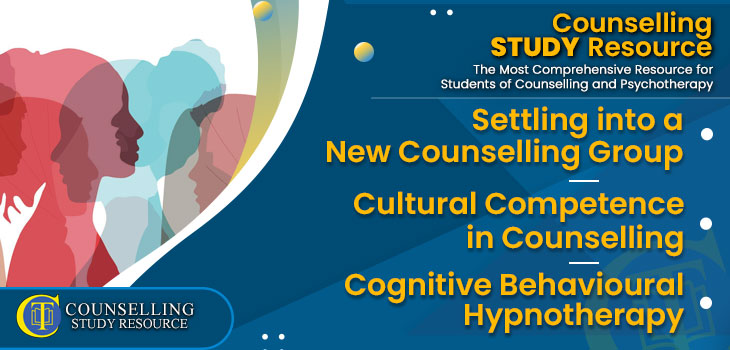274 – Cultural Competence in Counselling
Settling into a New Counselling Group – Cognitive Behavioural Hypnotherapy
NOTE: The Counselling Tutor Podcast is a free resource, which is available on the main Counselling Tutor website. We also place it in CSR for your ease of access. Unlike our other CSR resources, podcast episodes may include presenters’ opinions, and are not intended to be referenced for academic use.
In Episode 274 of the Counselling Tutor Podcast, your hosts Rory Lees-Oakes and Ken Kelly take us through this week’s three topics:
- Firstly in ‘Student Services’, we look at settling into a new counselling group.
- Then in ‘Ethical, Sustainable Counselling’, Rory and Ken discuss cultural competence in counselling.
- And lastly in ‘Practice Matters’, Rory speaks with Adam Cooper about his use of Cognitive Behavioural Hypnotherapy and other niches.
Settling into a New Counselling Group [starts at 02:33 mins]
Counselling Foundations is sponsored by
Counselling Skills Academy
Learn counselling techniques by seeing counselling skills used in real sessions by qualified therapists.
Real sessions - real-life presentations - real skills.
Starting a new year of study and changing counselling group can be exciting, but it may also bring some challenges. In this section, Rory and Ken discuss what these challenges might be, and the importance of understanding your own feelings:
- When a new group comes together, it can take time to settle in and to get to know each other.
- Feeling nervous is completely normal.
- It’s important that you can recognise these feelings. Seeing them in yourself and journalling about them will help you to understand them better.
- These feelings may mirror those of a client you see in the future, and understanding these feelings in yourself will help you develop empathy.
- Adjusting to a new counselling group can be a rich area for personal development.
- You may experience feelings of mourning for your previous group.
- It’s important to recognise and accept that everything has an end.
- Your counselling group should be a safe place, or, a safe place for you to feel unsafe. It’s similar to what you should aim to give your client later on.
A handout on Tuckman's Team Development Model is available for download in the green button above.
Cultural Competence in Counselling [starts at 24:00 mins]
During your training you will look at equality and diversity, but this is a growing area that you will require constant and continuing professional development in.
The main points of this section on cultural competence in counselling include:
- How much do you actually know and understand about other cultures?
- Instead of saying ‘Yes, we offer counselling for everyone.’ Are you able to comfortably and confidently say you offer counselling for a specific ethinicity, sexuality, or to those who are neurodiverse?
- Having cultural competence in counselling helps you understand not just the client’s difficulty, but also their frame of reference.
- People should feel seen, understood, and included.
- You don’t have to be an expert - just make yourself more aware.
- When striving to be a more culturally competent counsellor, remember that knowledge is powerful – just little things can make a huge difference to a client.
Cognitive Behavioural Hypnotherapy [starts at 36:58 mins]
The National Counselling Society is proud to sponsor Practice Matters.
NCS are really excited to have launched their Children and Young People Therapist Register for counsellors working with the younger age group.
In this week’s ‘Practice Matters’, Rory speaks with Adam Cooper, a serving member of the armed forces, about his use of Cognitive Behavioural Hypnotherapy.
The key points of this discussion include:
- When it comes to working with those in the armed forces, they might respond better to a certain type of counsellor/counselling.
- Cognitive Behavioural Hypnotherapy – the integrative approach of combining CBT with hypnotherapy. Allows for the problem solving, straightforward aspect of CBT, and the aspects of hypnotherapy that allow the mind to relax.
- It can be easier to gain rapport with those in the same close-knit group as yourself, having experienced the same things.
- In a line of work that requires a clear head and sharp decision-making, you learn to delay your emotions, leaving them to be addressed another time.
- You experience the regular stresses of being home, on top of the stresses of the job.
- You can sometimes feel like an outsider when you return home.
- Therapy could help with problem solving, lowering stress and opening up easier.
- There is no set way of doing things when you get home like there is when you’re deployed.
- Using CBT to help you think about what it is that you want.
- Using hypnotherapy to formally learn how to relax, being more open to suggestion, and giving a client a way to get some relief/mindfulness.
- Therapy can help give a better frame of mind.


